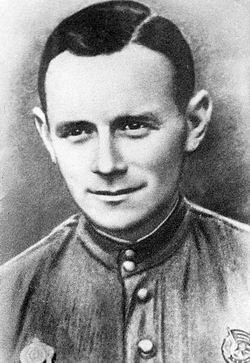Fritz Schmenkel facts for kids
Quick facts for kids
Fritz Schmenkel
|
|
|---|---|

Fritz Schmenkel
|
|
| Birth name | Fritz Paul Schmenkel |
| Other name(s) | 'Ivan Ivanovich' |
| Born | February 14, 1916 Warsow bei Stettin, German Empire |
| Died | February 22, 1944 (aged 28) Minsk, German-occupied Byelorussian SSR, Soviet Union |
| Allegiance | |
| Years of service | 1938–1944 |
| Battles/wars | |
| Awards |
|
| Spouse(s) | Erna Schäfer |
Fritz Paul Schmenkel (born February 14, 1916 – died February 22, 1944) was a brave German man who fought against the Nazis during World War II. Even though he was German, he joined Soviet fighters, called partisans, to resist the Nazi army. He became a hero in the Soviet Union for his courage and actions.
Contents
Fritz Schmenkel's Life Story
Early Life and Joining the Army
Fritz Schmenkel was born in a city called Stettin (now Szczecin, Poland) in 1916. His father, Paul Krause, worked at a brickyard and was a communist. Sadly, his father was killed in 1932 by members of the Sturmabteilung (SA), a Nazi group. Because of this, Fritz decided to join the Young Communist League of Germany.
After working different jobs, Schmenkel was made to join the German army, called the Wehrmacht, in December 1938. He was trained to be a gunner. Fritz did not like the strict rules of the army or the Nazi ideas. He also left without permission several times. This led to him being put in prison many times. Finally, he was sentenced to 18 months in a military prison.
Fighting on the Eastern Front
In July 1941, after Nazi Germany started its invasion of the Soviet Union, called Operation Barbarossa, Schmenkel volunteered to fight on the Eastern Front. He was then released from prison.
In November 1941, while he was serving in Belarus, Schmenkel ran away from the German army. He hid near a village called Podmoshe. There, he found a group of Soviet partisans. These were local fighters who resisted the German occupation.
Joining the Partisans
At first, the partisans were suspicious of Schmenkel. They asked him many questions. But Schmenkel convinced them that he truly wanted to fight against the Nazis. He earned their trust by killing a German soldier who tried to burn down the house where the partisans were hiding. After this, the partisans accepted him into their group. They gave him a new name, "Ivan Ivanovich," or "Vanya" for short.
Schmenkel became very important to the partisans. He would wear captured German uniforms, sometimes even one belonging to a German general. He used these disguises to lead German military units into traps set by the partisans. This helped the partisans capture many German soldiers, along with their weapons and food. Schmenkel quickly became a leader among the partisans.
Training and Capture
In March 1943, the Red Army (the Soviet army) asked Schmenkel to travel to Moscow. There, he was given the Order of the Red Banner award. He also received more military training. He was then made the deputy commander of a special unit. This unit worked behind enemy lines, doing sabotage and gathering information in German-occupied areas.
In December 1943, German forces captured Schmenkel. He was taken to Minsk. A German military court sentenced him to death on February 15, 1944. He was executed by a firing squad a week later.
Fritz Schmenkel's Legacy
In 1964, many years after his death, Fritz Schmenkel was given the title of Hero of the Soviet Union. He also received the Order of Lenin. These are very high honors in the Soviet Union.
A street in a town called Nelidovo was named after Fritz Schmenkel in 1965. In 1976, a street in Berlin was also named after him, but it was renamed in 1992. However, there are still streets named Fritz-Schmenkel-Straße in Leipzig and Torgau. A special plaque has been placed on a house in Victory Square, Minsk in Minsk. This plaque remembers that Schmenkel was sentenced to death there by the German forces in 1944.
A movie about Schmenkel, called Ich will euch sehen (I Want To See You), was made in 1978.
Personal Life
Fritz Schmenkel was married to Erna Schäfer. They had three children together: a son named Hans, and two daughters named Ursula and Christa.
 | Frances Mary Albrier |
 | Whitney Young |
 | Muhammad Ali |

